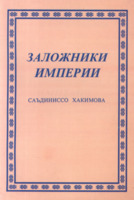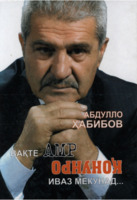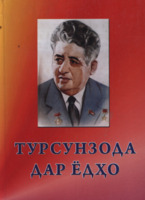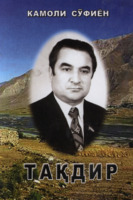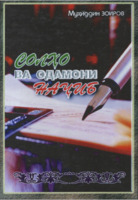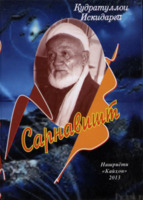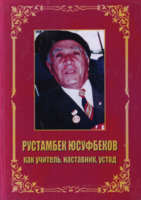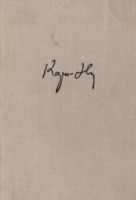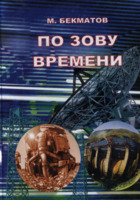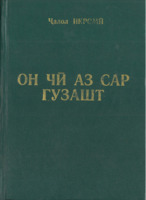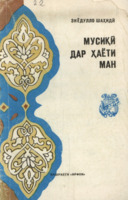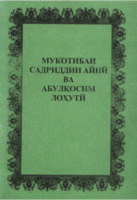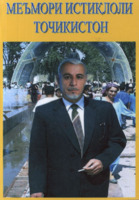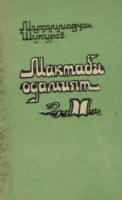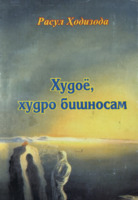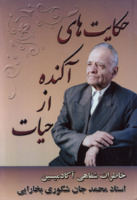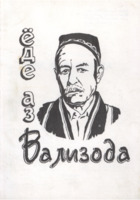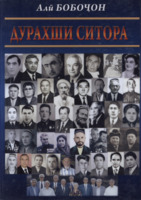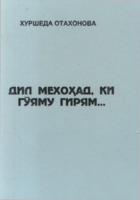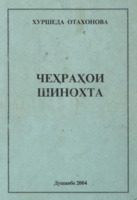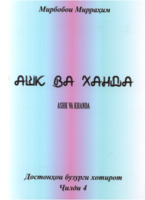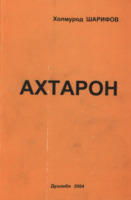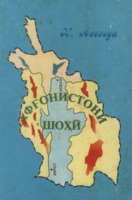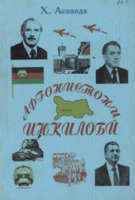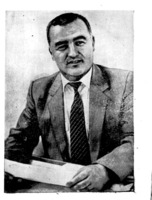Browse Documents (8724 total)
Заложники империи Hostages of Empire
From the publisher: Автор документально показывает планомерное уничтожение таджикского этноса, которое достигло необычайного размаха в Узбекистане, населенном, главным образом, таджиками, и в самом Таджикистане в послевоенные годы при негласной поддержке ЦК КПСС и Союзного правительства.
Sa''diniso Hakimova (1924-2015) was a Tajik surgeon, professor, and director of the Tajik SSR Ministry of Health Research Institute for the Protection of Mothers and Children. She was one of the first Tajik women to earn a medical degree (in 1943), and later the first to write a dissertation for a Doctorate of Medicine, which she defended in 1958. Her experience working on maternal and child health in Tajikistan led her to be increasingly critical of the public health system. Eventually, she came to subscribe to some of the more nationalistic theories that gained currency on the eve of the Soviet collapse, blaming public health issues on a concerted campaign of genocide carried out by Uzbeks with the tacit support of the Soviet government. This volume nevertheless contains valuable insights into the workings of the health system in the Tajik SSR, as well as documentary sources from the author’s personal archive.
Вақте амр қонунро иваз мекунад. The Times When Life Changes Law
From the publisher: Дар ин китоб мақола ва мусоҳибаҳои матбуотии Ҳабибов Абдулло Ҳабибович гирд омадаанд, ки хонандаро бо воқеияти таърихи на чандон дури ҳаёти ҷомеаи Тоҷикистон ошно мекунанд.
Abdullo Habibov (1940-) was a Soviet Party worker, educated in Tajikistan and in Moscow, where he attended the Academy of Social Sciences of the CC CPSU and received the degree of Candidate of Historical Sciences. In the 1980s he was appointed the head of the "Political Section" of the Tajik Ministry of the Interior. He later came to prominence during the February 1990 riots in Dushanbe, when he supported Buri Karimov and the massed protestors. This volume collects a series of his writings about the late Soviet period and a number of explicatory interviews.
Турсунзода дар ёдҳо Recollections about Tursunzoda
From the publisher: Мунодии сулҳу вассофи Ватан, шоири тавонову мураббии аҳли сухан ва яке аз муборизони фаьоли дӯстии халқхои олам Мирзо Турсунзода бо хислатхои наҷибонаю ашъори рангини хеш дар дили хамватанону хамкаламон абадан маскан гирифтааст. «Турсунзода дар ёдхо» дастагулест аз хотироти адибони бузурги олам ва дӯсзону аҳли қалам, ки ба муносибати 100-солагии ин сухансолори бузург пешкашатон мегардад.
Mirzo Tursunzoda (1911-1977) was a Tajik poet and writer, still recognized as one of the most important figures in 20th century Tajik literature. Many of his poems focused on anti-colonial themes. Tursunzoda held a number of important government posts, including chairman of the Soviet Committee for Solidarity with the Countries of Asia and Africa (SKSSAA), member of the Committee for Peace, chairman of the Union of Writers of the Tajik SSR, and a member of the Central Committee of the Communist Party of the Tajik SSR. This volume collects recollections from dozens of writers and colleagues, including Loiq Sherali, Aleksandr Dzasohov, Iosif Braginskiy, Gulnazar, and Rasul Gamzatov.
Mirzo Tursunzoda (1911-1977) was a Tajik poet and writer, still recognized as one of the most important figures in 20th century Tajik literature. Many of his poems focused on anti-colonial themes. Tursunzoda held a number of important government posts, including chairman of the Soviet Committee for Solidarity with the Countries of Asia and Africa (SKSSAA), member of the Committee for Peace, chairman of the Union of Writers of the Tajik SSR, and a member of the Central Committee of the Communist Party of the Tajik SSR. This volume collects recollections from dozens of writers and colleagues, including Loiq Sherali, Aleksandr Dzasohov, Iosif Braginskiy, Gulnazar, and Rasul Gamzatov.
Тақдир (хотира ва
ёддоштҳо)
Fate (memoirs)
From the publisher: «Такдир» хотира ва ёддоштҳои ходими маъруфи ҳизбиву ҷамиятӣ Камоли Суфиён буда, аз талху шириниҳои рӯзгор ва лаҳзаҳои хотирмону нотакрор ҳикоят мекунад. Роҳи паймуда ва қисмати қаҳрамони марказй ибратбахшу пандомӯз аст, махсусан, барои ҷавонон.
Kamol Sufiyon (Sufiev) 1931–? was a Communist Party official who rose to be Minister of Horticulture of the Tajik SSR and continued his political career after the Soviet collapse. This memoir covers his childhood near Nurek in the 1930s, his time in the Komsomol, the war years, the building of the Danghara canal in the post-war years, military service in Ashkhabad (Turkmenistan) and his Party career in a number of districts, including Ordzhonikidzeabad (Vahdat).
Солҳо ва одамони наҷиб. (аз дафтари хотира). Interesting times and interesting people
Muhiddin Zoirov (1931-2018) was a Tajikistani Party and government official. Originally from the village of Laqqon in Badakhshan, he studied agriculture in Dushanbe before embarking on a Party career that saw him rise to the post of Minister of Agriculture of the Tajik SSR and First Secretary of Gorno-Badakshan party organization. This volume collects his thoughts on various state and Party figures he encountered in his career, including Jabbor Rasulov, Abdulahad Kakhorov, as well as many local officials, farm managers, and others. The volume includes over 40 pages of photographs from the author's collection.
Сарнавишт Fate
From the publisher: Қудратуллоҳи Искидарғи дар иигоштаҳояш бо номи «Сарнавишт» аз дидаву шунидаҳояш бозгӯ шудааст, ки паҳлӯуои норӯшани ҳаёти солиёни гузаштаи рӯзгорашро рушанӣ меандозанд.
Qudratulloi Iskidarghi (Sharifi Jamil Qudrati), b. 1927, was a longtime employee of the Tajik SSR's Committee for Radio and Television, and worked closedly from 1960s-1980s with many television and movie directors. Originally from the small village of Dargh near Aini, his memoir comments on his work and origins.
Рустем Юсуфебков как учитель, наставник, устод. Rustem Iusufbekov: teacher, mentor, professor.
From the publisher: Книга посвящена известному таджикскому ученому, политэконому, специалисту по экономическим проблемам образования, государственному деятелю, члену-корреспонденту АН Республики Таджикистан, заслуженному деятелю науки, доктору экономических наук, профессору Рустамбеку Юсуфбекову. Книга включает статьи о научной и творческой деятельности Рустамбека Юсуфбекова с основными датами жизни и деятельности, список опубликованных работ, работ, редактированных ученым, а также литературу о нем.
This volume is a collection of reminiscences about the educator and government official Rustem Iusufbekov (1923-2007). Originally from Ishakshim, Iusufebkov began his career as a schoolteacher before joining the communist party and later completing graduate work in economics, eventually becoming the head of the Political Economy department at the State University in Dushanbe. He then had a number of senior party and state positions, including Minister of Education of the Tajik SSR (1963-1974) and Deputy Chairman of the Council of Ministers of the Tajik SSR (1974-1984).
Размышленние о пройденном пути Reflections on the path I've walked
From the publisher: Эта книга — воспоминания одного из старейших ученых Узбекистана, Героя Социалистического Труда, члена Академии наук Узбекской ССР Т.Н. Кары-Ниязова. В основе ее содержится материал книги, вышедшей в 1967 году в Ташкенте под таким же названием. Готовя книгу к настоящему изданию, автор сделал дополнения. Он рассказывает о состоянии культуры в Туркестане в дооктябрьский период и о культурном и научном строительстве в Узбекской ССР . Читатель узнает о замечательных людях, с которыми автору пришлось вместе работать, о содружестве ученых разных национальностей, о их вкладе в развитие нашей Родины. В последней главе автор делится впечатлениями поездок в разные страны.
Tashmuhammed Niazovich Kary-Niazov (1897–1970) was an Uzbek educator, mathematician, and historian. This memoir, published during the Soviet era, covers his childhood in pre-revolutionary Central Asia, work as a teacher and educator after the revolution, involvement with the alphabet reforms of the 1940s, as well as his travels to Italy, Japan, Afghanistan, India, and Bulgaria. This is the second, expanded, edition, of a memoir that first appeared in Tashkent in 1967.
По зову времени Answering the call of time
From the publisher: М.Бекматов - личность в нашей республике известная. Он участник Великой Отечественной войны, долгое время проработавший на ответственных должностях в различных партийных и хозяйственных органов г.Куляба и Кулябской области. Сейчас он на пенсии. Но несмотря на это продолжает активную жизненную позицию. На суд читателя он представляет свою документальную повесть, в которой подробно рассказывает о тех русских людях, которые в трудные для Таджикистана годы приехали в Таджикистан и помогали в его становлении и развитии. Многие из них также как и автор повести трудились в высших партийных и хозяйственных органах власти.
Mirzo Bekmatov was born in 1924 in Shurabad district. He worked as a teacher and joined the Red Army in 1943, earning a commission as an officer. He later made a career as a party official, serving as First Secretary of the Kulyab Oblast from 1965-1974. This book is meant to honor Russians who came to Tajikistan during the Soviet period as party officials, engineers, or other specialists.
Он чӣ аз саргузашт
The stuff of memoirs
From the publisher: Ин китоби охирини Ҷалол Икромӣ мебошад. Нависанда дар бораи солҳои наврасиаш, хешу табораш, революсияи сосиалистии Бухоро ва сарнагун шудани республикаи сосиалистии Бухоро, тараққиёт ва сабзиши республикаи сосиалистии Тоҷикистон сухан меронад. Саҳифаҳои зиёде ба солҳои мудҳиши 1937-39 бахшида шудааст.
Jalol Ikromi (1909-1993) was one of Soviet Tajikistan's most famous writers. This memoir covers his childhood in Bukhara as well his eventual move to Stalinabad (Dushanbe). A substantial portion of the memoir is devoted to the effect of the great terror on his own family and on the intelligentsia more generally. The final pages contain his reflections on Perestroika and the collapse of the USSR.
Мусиқӣ дар ҳаёти ман Music in my life
From the publisher: Китоби «Мусиқӣ дар ҳаёти ман» доир ба мафҳуми мусиқӣ, таъсиру хосиятҳои он, роҷеъ ба фаъолияти бастакорони тоҷик ва марҳилаҳои инкишофи он маълумот медиҳад.
Ziyodullo Shahidi (1914-1985) was a Tajik musician, conductor, and composer. Originally trained in the Maqom tradition, Shahidi was recruited to the Moscow conservatory, where he studied with Aleksandr Lensky, Vladimir Fere, and Sergey Balasanyan - all of whom were involved in the project of "modernizing" indigenous musical traditions across the USSR. The volume collects Shahidi's essays on the music of other composers, as well as accounts of his initial recruitment, studies, work with the poet A. Dehoti, and other episodes from his career.
Ziyodullo Shahidi (1914-1985) was a Tajik musician, conductor, and composer. Originally trained in the Maqom tradition, Shahidi was recruited to the Moscow conservatory, where he studied with Aleksandr Lensky, Vladimir Fere, and Sergey Balasanyan - all of whom were involved in the project of "modernizing" indigenous musical traditions across the USSR. The volume collects Shahidi's essays on the music of other composers, as well as accounts of his initial recruitment, studies, work with the poet A. Dehoti, and other episodes from his career.
Мукотибаи Садриддин Айнӣ ва Абулқосим Лоҳутй. The correspondence of Sadriddin Ayni and Abdulqosem Lahuti
From the publisher: Ин китоб аз мактубҳои ду устоди бузург, Қаҳрамони Тоҷикистон Садриддин Айнӣ ва Абулқосим Лоҳутӣ фароҳам омадааст. Мактубҳо қимати илмиву адабӣ ва таърихӣ доранд.
This is a collection of correspondence between two of Soviet Tajikistan’s most prominent writers: Sadriddin Ayni (1878–1954) and Abdulqosim Lahuti (1887-1957). While both became part of the Tajik literary pantheon, neither had their primary residence in the republic. Ayni spent most of his life in Samarqand, while Lahuti lived in Moscow with his wife, Cecilia Bonu. These letters, held at the Archive of the Rudaki Institute of Literature in Dushanbe, were first published during the Soviet era. This second, more complete edition, includes additional letters from the period of the terror, when Ayni in particular was put under a great deal of pressure. The publication was prepared and edited by Khursheda Otahonova.
This is a collection of correspondence between two of Soviet Tajikistan’s most prominent writers: Sadriddin Ayni (1878–1954) and Abdulqosim Lahuti (1887-1957). While both became part of the Tajik literary pantheon, neither had their primary residence in the republic. Ayni spent most of his life in Samarqand, while Lahuti lived in Moscow with his wife, Cecilia Bonu. These letters, held at the Archive of the Rudaki Institute of Literature in Dushanbe, were first published during the Soviet era. This second, more complete edition, includes additional letters from the period of the terror, when Ayni in particular was put under a great deal of pressure. The publication was prepared and edited by Khursheda Otahonova.
Меъмори истиқлоли Тоҷикистон Architect of Tajikistan's Independence
From the publisher: Хонандаи гиромӣ, китобе, ки дар даст дорӣ, маҷмӯаест, аз навиштаҳои донишмандон ва журналистони шинохтаи кишвар аз рӯзгор ва пайкори шахсияти мубориз ва донишманду маорифпарвари машҳур Тоҳири Абдуцаббор, ки ба ҳангоми беморӣ ва даргузашти ин абармарди Тоҷикистон бунёдгузори эҳёи истиқлол ва мақоми расмии забони форсим тоҷикй дар замони нав ба табъ расидааст. Хамчунин дар ин маҷмӯа чанде аз навиштаҳои ин донишманд барои нахустин бор дар шакли маҷмӯа ба дам оварда шудааст.
Tohir Abdujabbor (1946-2009) is best known as the founder of Rastokhez (Rebirth), the first independent political organization in Tajikistan, which campaigned for the primacy of the Taiik language, greater political and economic autonomy and, eventually, independence. Abdujabbor trained as an economist, earning his kandidatskaia degree at the Institute of Oriental Studies in Moscow with a dissertation on Pakistan; he later served as an economic adviser and translator in Afghanistan. During the civil war he fled first to Tehran, later settling in Bishkek before returning to Tajikistan in 2005. Unfortunately, he did not leave behind any memoirs. This volume includes some insightful reminiscences about Abdujabbor by his former colleagues and associates, as well as some his key writings from the late Soviet period and beyond.
Мактаби одамият: Баъзе масъалаҳои адабиёт
ва маънавият.
The School of humaneness: some questions of literature and spirituality
Muhammadjon Shakuri (Shakurov) (1924-2012) was a Tajik philologist and academician. He studied at the pedagogical institute in Dushanbe and later earned his kandidatskaia and doktorskaia degrees at the Institute of World Literature in Moscow. His professional home, however, remained the Rudaki Institute of Language and Literature in Dushanbe. In the late 1980s he became a leading figure in the campaign for the primacy of the Tajik language. This volume collects a number of his articles on the relationship between literature, spirituality, and morality. It also includes several pieces recounting experiences with Sadriddin Ayni, Mirzo Tursonzoda, A. Dehoti, and Mirsaid Mirshakar.
Худое, худро бишиносам To know oneself and to know God
From the publisher: Олим ва нависандаи маъруф Расул Ҳодизода дар китоби хотироташ ҳамзамон бо тасвири марҳилаҳои зиндаги ва фаъолияти худ дар бораи воқеахри таърихии илму маданият ва симохри шинохтаи адабиёт, илм ва фарх,анги тоҷик хркоятхри ҷолиб аз диду дили худ нақл намудааст. Чунонки муаллиф гуфтааст, ин китоб "еде аз саҳифаҳои таърихи замой ва одамон аст", ки 6а хонандаи имруз тақдим мешавад.
Rasul Hodizoda (1928-2010) was a writer, translator, and scholar. Born in Samarkand, he studied in Tashkent, worked briefly in radio, and later did graduate work in Moscow. Hodizoda spent most of his career at the Rudaki Institute in Dushanbe, but was also active in the Union of Writers and published in all-union publications such as Druzhba Narodov. These particularly detailed memoirs cover his childhood, education, and career. Hodizoda also provides detail on his experiences writing a novel about Ahmad Donish and his relationship with mentors like Sadriddin Ayni, Mikhail Andreev, and Aleksandr Semenov, as well as contemporaries like Muhamadjon Shakurov (Shakuri), Shavqat Niezi, Semen Lipkin, and Mikhail Zand.
حکایتها آکنده از حیات Stories full of life
Muhammadjon Shakuri (Shakurov) (1924-2012) was a Tajik philologist and academician. He studied at the pedagogical institute in Dushanbe and later earned his kandidatskaia and doktorskaia degrees at the Institute of World Literature in Moscow. His professional home, however, remained the Rudaki Institute of Language and Literature in Dushanbe. In the late 1980s he became a leading figure in the campaign for the primacy of the Tajik language. This volume, published in the Arabic/Persian script with the support of the Iranian Embassy in Dushanbe, includes accounts of raising Tajik-speaking children in a mixed family (his wife was Russian), his experience studying for a graduate degree, and his perestroika-era activism.
Ёде аз Вализода Memories of Valizoda
From the publisher: Дар китоб ёдномаҳое гирд оварда шудаанд, ки ба калами олимон, шоиру нависандагон, дӯстону наздикони Саидалй Вализода мутааллиқанд. Китоб оммаи хонандагонро ба хислатҳои наҷиби ин адиб ва ҳунарманди халқи тоҷик шинос намуда,, аз мақоми хоси шоир дар таърихи адабиёти шифоҳии халқи тоҷик ва эътирофу қадршиносии мардум иисбат ба фарзанди баруманди халқ нақл мекунад.
Saidali Valizoda (1900-1971) was a Tajik poet, musician, performer, and educator. After working at a theatre in Stalinabad he returned to Hovaling, his home district, in 1938, where he worked at a boarding school (internat). He continued writing and publishing in the decades after the Great Patriotic War. This volume collects recollections about Valizoda and poems written in his honor by writers like Boki Rahimzoda, Jolol Ikramov, Abdusalom Dekhoti, and others.
Saidali Valizoda (1900-1971) was a Tajik poet, musician, performer, and educator. After working at a theatre in Stalinabad he returned to Hovaling, his home district, in 1938, where he worked at a boarding school (internat). He continued writing and publishing in the decades after the Great Patriotic War. This volume collects recollections about Valizoda and poems written in his honor by writers like Boki Rahimzoda, Jolol Ikramov, Abdusalom Dekhoti, and others.
Дурахши ситора (очерк ва мақолаҳо). Shining stars: sketches and articles
From the publisher: Маҷмӯаро мавзӯъҳое фаро мегирад, ки дар онҳо касбу пешаҳои мухталиф дар мисоли рӯзгору фаъолияти соҳибистеъдодҳо, номварону номбардорони сарзамини аҷдодӣ ба қалам омада, аз як тараф, мутолеонро аз бисёр ҷиҳат ба гузаштаҳои пурифтихорамон мешиносонанд ва аз ҷониби дигар, дастури боэътимоде ҳастанд пайи ҳадафқои шойиста хддоях кардани хонандаи имрӯз.
A collection of the journalist Ali Bobojon's sketches and articles about Tajik artists and writers.
Дил мехоҳад, ки гӯяму гирям My heart wishes for me to speak and to weep
From the publisher: Ин китоб аз ду қисм иборат буда, қисми аввал «Дил мехоҳад, ки гӯяму гирям” ном дорад. Муаллиф дар он хотираҳои айёми тифлӣ ва ҷавснии худро рӯйи коғаз овардааст, ки ба воқеаҳои соли 1937 марбут аст. Селоби хунолудаи даврони сталинй оилаи ин зиёии тоҷикро низ ба гирдоби худ кашида буд. Муаллиф ҳодисаҳоеро ёдовар шудааст, ки падари ғамхору меҳрубон ва модари мискину бенавояш аз сар'гузаронидаанд..У дар симои модар тоқат, матонат, сидиу вафо ва покии дили як нафар зани ба фоҷиаи мудҳиш рӯбарӯшудаи тоҷикро таҷассум намудааст. Қисми дуюм аз хотираҳо ва очеркҳои илмию оммавӣ иборат буда, фаъолияти илмию адабии чеҳраҳои намоёни илму фарҳангро фаро гирифтаанд. Инҳо Мирзо Турсунзода, Носирҷон Маъсумй, Муҳаммад Осимӣ, Аҳрор Мухторов, Раҷаб Амонов ва дигарон мебошанд.
Khursheda Otakhonova was a Tajik literary historian, known in particular for her work on Abdulqassim Lahuti and Sadriddin Ayni. The first part of these memoirs, initially published in Sadoi Sharq,discusses the effect of Stalin’s purges on Otakhonova’s own family. Her father, Otahon Musohojaev, joined the Komsomol in 1919 and became a Party member in 1923; he was arrested in 1937. Hursheda and her mother sought shelter in Istarafshan; her father was released in 1944 but was not rehabilitated until 1957. Later chapters cover the author’s experience with prominent intellectuals and literary figures, including Abduqodir Manyezov and Mirzo Tursonzade.
Чеҳраҳои шинохта Familiar Faces
From the publisher: Дар ин китоб паҳлуҳои гуногуни эҷодиёти чанд тан аз адибони барҷастаи муосири тоҷик, аз ҷумла Зуфархон Ҷавҳари, Садриддин Айнӣ, Абулқосим Лоҳутӣ, Пайрав Сулаймонӣ, Мирзо Турсунзода, Раҳим Ҷалил, Мӯъмин Қаноат ва дигарон мавриди баррасӣ қарор гирифтааст.
Khursheda Otakhonova (1932-2016) was a Tajik literary historian, known in particular for her work on Abdulqassim Lahuti and Sadriddin Ayni. This volume collects a number of articles by Khursheda Otakhonova on Tajik writers like Sadriddin Ayni, A. Lahuti, Mirzo Tursunzoda, Sotim Ulughzoda, and others. The second half of volume includes her personal recollections about Mohammed Osimi, Tursunzoda, Abdullojon Gafforov, Habibullohon Saidmurodov, and Suhayli Javharizoda.
Ашк ва ханда
Love and laughter
From the publisher: Зиндагии инсон миёни талхиву ширищо сипарй мешавад ва шояд мо кам ба он таваҷҷӯҳ дорем ва на ҳама вақт ба қадри он мерасем. Дар ишрищои зиндагӣ ёде аз талхщост ва дар талхиҳои он намакест аз ширищо. Лаҳзаҳое, ки зиндагии ман ва хонаводаам ҳамчун ашк дар сари мижгон меистод ва ҳар дам номулоиматщо ва нохушояндщое дар як сарзамини дигар бар сари бандаи гариб таҳдид дошт, ба тасвири талхиву ширищои рузгор ва кори баргардони ҳикматҳо ва латифаҳои беҳтарини дунё пардохтам ва он душворщоро бо хандаҳои гиряолуд ороставу пироста сохтам.
Mirboboi Mirrahim (Mirbobo MIrrahimov) is a translator and expert in pre-Islamic religions. During perestroika, he became famous for his writings on the Tajik language and was one of the first writers to publicly discuss the status of Samarqand and Bukhara. He also became one of the cofounders of Rastokhez, Tajikistan's first independent political organization. This volume of his memoirs, however, covers earlier years in the 1970s and 1980s and describes his experiences at university in Dushanbe, interactions with Tajik poets, and commentary on other writers' works.
Mirboboi Mirrahim (Mirbobo MIrrahimov) is a translator and expert in pre-Islamic religions. During perestroika, he became famous for his writings on the Tajik language and was one of the first writers to publicly discuss the status of Samarqand and Bukhara. He also became one of the cofounders of Rastokhez, Tajikistan's first independent political organization. This volume of his memoirs, however, covers earlier years in the 1970s and 1980s and describes his experiences at university in Dushanbe, interactions with Tajik poets, and commentary on other writers' works.
Ахтарон. Маҷмӯи ёддоштҳо Stars. Collected memoirs
From the publisher: Китоби нависанда Холмурод Шарифов “Ахтарон" асари ёддоштӣ буда, дар он муаллиф маҳорати нигорандагии худро бо нозукиҳояш намоиш додааст. “Ахтарон" нусхаи такмилёфтаи ёддоштҳои мусанниф “Оламафрӯзон" (Душанбе, “Маориф" 1992 ва “Ахтарони фарҳанг" (Душанбе, “Ирфон” 2002) буда, дар он иловаҳои зиёд ворид гардидаанд. Бахшҳои ёддоштӣ роҷеъ ба Суҳайлӣ Ҷавҳаризода, Мирсаид Миршакар, Раҳим Ҷалил ва Одина Ҳошим иловаҳои тозаанд. Ёддоштнависӣ аз жанрҳои душвори адабиёт маҳсуб ёфта, он диди хос, дарки амиқи матлаб, маҳорати фавқулоддаро дар масоили доги умдаи рӯз талаб мекунад. Омӯхтаву андӯхтаҳои муаллиф дар шакли ёддоштҳои ҷолибу хотирнишин ва латифу ҳикматангез рӯи когаз омадаву дар ҳамин китоби пурмӯҳтаво манзури хонандагони сершумор, хусусан омӯзгорон мегардад.
Holmurod Sharifov (1927-2017) was a Tajik-Soviet party and government official. Originally from the area of Panjikent, he and his family were resettled in the Vaksh valley in 1937; after 1946 he embarked on a career in the Komsomol and later in the Party. He eventually earned a kandidatskaia degree from the Academy of Social Sciences of the CPSU. He served as Deputy Minister of Culture and Central Committee Secretary for Culture of the Communist Party of Tajikistan from 1968-1979. He was also a member of the Soviet Committee for Solidarity with the Countries of Asia and Africa. This book collects previously published recollections about Soviet-Tajik cultural figures, including those he traveled with as part of official trips to Afghanistan, the USA, Canada, Bulgaria, and beyond. Among the many figures discussed in the book are Sadriddin Ayni, Mirzo Tursunzoda, the film director Boris Kimergerov, and Bobojon Gafurov.
Афғонистони шоҳӣ Royal Afghanistan
From the publisher: Хонандаи гироми! Китобе, ки дар даст доред хотираҳои сафари як ҷавони тоҷиканд, ки дар тули се сол (1971-73) дар Афғонистон ба ҳайси тарҷумон ҳамроҳи маъданшиносони Шӯрави хидмат кардааст. Муаллиф гохдо ба тартиби рӯзҳо риоя карда, вале аксаран ба тарзи умумият додани воқеоту ҳавводиси аз сар гузаронида, дидаву шунидаҳояшро рӯи коғаз овардааст. Китоб инчунин руҷуъҳои муаллифро ба гузаштаву зиндагии муосири мардуми тоҷику афган дар бар мегирад. Аз ин ҷиҳат ҳам баробари дигар фазилатҳояш қобили таваҷҷӯҳи хонандагон хоҳад гардид.
H. Asozoda (1941-2014) was a prominent literary historian and educator who served two tours as an interpreter in Afghanistan. This book covers the author's first period in the country, from 1971-1973, when he accompanied a team of Soviet geologists conducting exploratory works around the country. It includes accounts of interactions with ordinary Afghanistanis, as well as cultural and political figures. This volume also includes the author's impressions of Afghanistani politics during a period which saw the end of the monarchy and the foundation of a republic by Mohammed Daoud.
Афғонистони инқилобӣ Revolutionary Afghanistan
From the publisher: Китоби «Афғонистони инқилобӣ», ки дар даст доред, идомаи навиштаи пешинаи муаллиф бо номи «Афгонистони шоҳӣ» (Д.: Деваштич, 2002) мебошад. Дар ин ҷо сухан аз ҳаводису воқеоте меравад, ки нигоранда дар тӯли солҳои 1978-1981 шоҳиди онҳо будааст. Китоби «Афғонистони инқилобӣ» барои устодону донишҷӯёни таърихшинос, барои ҳамаи ононе, кимехоҳанд аз тақдири Афғонистону мардуми афгон дар солҳои 1978-81 иттилое дошта бошанд, мароқовару ҷолиб мебошад. Ин китобест, ки бо усули қисса андар қисса нигошта шудааст. Аз ин рӯ онро бояд аз ибтидо то интиҳо хонд.
H. Asozoda (1941-2014) was a prominent literary historian and educator who served two tours as an interpreter in Afghanistan. This is the second of H. Asozoda's Afghanistan memoirs, covering the author's service as an interpreter after the Saur Revolution (April 1978) until 1981. The book discusses interactions with other interpreters, advisors, and officers, relations with Afghanistanis, daily life among Soviets working in Afghanistan, and prominent political figures like Hafizullah Amin and Nur Mohammed Taraki. The book also provides insights into the key political developments of those years as seen by an in interpreter.
Таркиш The Explosion
From the publisher: Яке аз ходимони барҷастаи сиёсӣ ва давлатӣ Ҳоҷи Ҳикматулло Насреддин (Насреддинов) китоби хотироти худро “Таркиш” номгузорӣ кардааст. Китоб марҳалаҳои гуногуни кору мушоҳидаҳои муаллифро дар сохтори ҳизбию давлатӣ ва тариқи роҳбариро дар ҷумҳурӣ дарбар мегирад.
Hikmatullo Nasreddinov (1939-) was a leading Tajik politician in the early 1980s and a protege of Rahmon Nabiev, the First Secretary of the Communist Party of Tajikistan from 1982 to 1985. Nasreddinov's memoir touches on the 1970s and early 1980s, but is largely focused on the final years of the USSR and the start of the Tajik Civil War in 1992, which he blames on the political course taken by Kahhor Mahkamov in the late 1980s.
Текст проповеди имама Московской мечети Салихова против использования ядерного оружия и агрессии англичан Sermon by the Moscow Mosque's Imam Salikhov against the use of the atomic weapons and the British aggression
Transcription
Translation
Справка о посещении Московской мечети представителем религиозного общества квакеров в Нью-Йорке
Transcription
Доклад о Бухаре Туркестанскому Бюро Ц.К.Р.К.П. с 15.IX по 18.X 1920 года политкома поезда БЦИК "Красный Восток"
Transcription
Протокол №15 Заседания Политического Бюро ЦК от 25-го мая 1920 года (слушали о восточной политике)
Transcription
Депеши от Чичерина, отправленные шифром Цукерману в Ташкент, о международных отношениях
Transcription
Ленину от Наркоминодел о недопустимости принятия решения об упразднении независимости Бухары
Transcription
Шифротелеграмма Ленину от Предсовобороны о возможных вариантах поведения в отношении Бухары
Transcription
Приложение 1 к письму Аксеверова о революционных партиях и их влиянии на положение дел на Востоке
Transcription
Письмо Н. Ленина о положении библиотечной группы
Transcription
Выписки из протокола № 3 заседания СДРК
Transcription
Выписки из протоколов № 1, 5 заседаний СДРК
Transcription
Выписка из протокола № 6 заседания СДРК
Transcription
Справка о посещении Московской мечети врачом из Тегерана
Transcription
Translation
Справка о посещении приема, устроенного посольством Бельгии в честь бельгийской королевы, имамом Московской мечети Салиховым
Transcription
Справка о посещении Московской мечети тремя турецкими инженерами
Transcription
Translation
Статистические данные, согласно Гостату за период между 1946-1950 года, о соблюдение религиозных обрядов и праздников
Transcription
Отчетный доклад Уполномоченного Совета по делам религиозных культов при Совете Министров СССР по Ленинградской обл.
Transcription
Краткая инфорфмация о религиозном движении мусульманского населения по Ростовской области
Transcription
Обзор арабской прессы касательно визита представителей мусульманского духовенства СССР в ОАР
Transcription
Текст проповеди имама Московской мечети Салихова по случаю приезда в мечеть Президента ОАР Гамаля Абдель Насера A preaching delivered by Imam Khatib Salikhov Kamaretdin at the Moscow Cathedral Mosque on Friday, 2 May 1958 in honor of the arrival of the President of the UAE, Gamal Abdel Naser
Transcription
Translation
Имам Ленинградской мечети Исаев о Багдадском пакте
Transcription
Справка о получении имамом Московской мечети Салиховым подарка от Министра национальной ориентации Египта Фатхи Радвана
Transcription
Имам Ленинградской мечети Исаев о Конференции солидарности стран Азии и Африки, прошедшей в Каире
Transcription
Справка о посещении Московской мечети израильским арабом Селимом Махмудом Касымом
Transcription
Translation
Справка о посещении приема, устроенного послом Судана в СССР по случаю Дня независимости, имамом Московской мечети Салиховым
Transcription
Справка о посещении Московской мечети делегацией египетских культурных деятелей
Transcription
Translation
